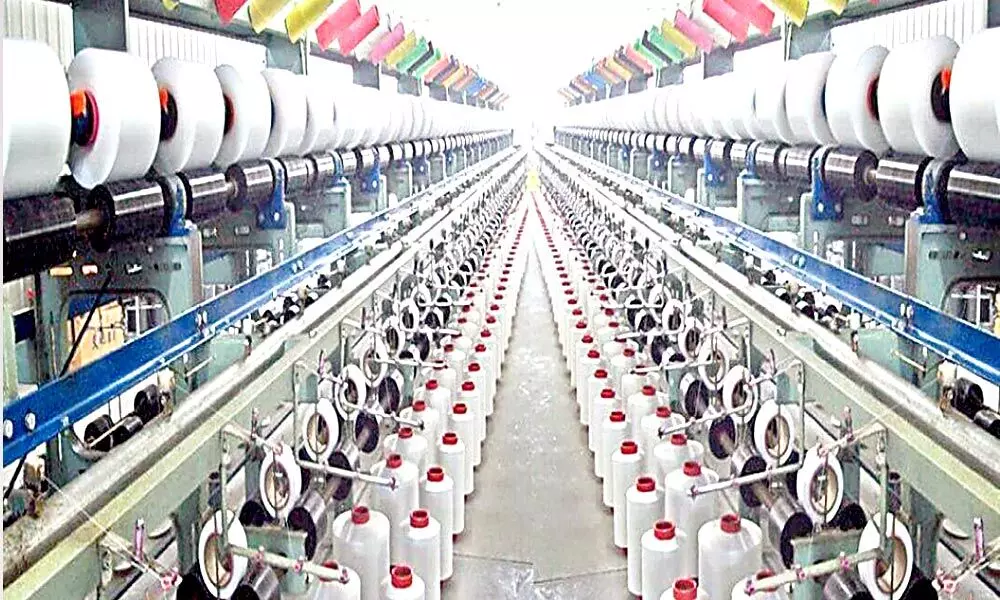Mega textile parks on the anvil
Customs duty on cotton raised from nil to 10 %, and on raw silk and silk yarn from 10 %to 15%
image for illustrative purpose

- BCD (basic customs duty) rates on caprolactam, nylon chips and nylon fibre & yarn uniformly reduced to 5% to help textile industry, MSMEs and exports
- Budget commits Rs 1.97 lakh crore in next 5 years starting FY 2021-22 to help bring scale and size in key sectors, create and nurture global champions
- Production Linked Incentive (PLI) schemes announced for 13 sectors to create manufacturing global champions for an Aatmanirbhar Bharat
New Delhi: The central government on Monday proposed a scheme for setting up mega textile parks in the country to enable India's textile industry to become globally competitive, attract large investments and boost employment generation through creation of world-class infrastructure. Finance Minister Nirmala Sitharaman made the announcement while presenting the Budget for 2021-22 in Parliament. She said that seven mega textile parks will be established over three years as part of the scheme. "To enable the textile industry to become globally competitive, attract large investments and boost employment generation, a scheme of mega investment textile park will be launched in addition to the PLI schemes," Sitharaman said.
"This will create world-class infrastructure with plug-and-play facilities to enable create global champions in exports. Seven textile parks will be established over three years," she added. The mega textile parks will have integrated facilities and quick turnaround time for minimizing transportation losses, eyeing big-ticket investments in the sector. Textiles Minister Smriti Irani in a tweet said that the announcement on Mega Investment Textiles Parks (MITRA) will be a game changer for the Indian Textiles Industry. Along with the Production Linked Incentive (PLI) scheme, MITRA will lead to increased investments and enhanced employment opportunities, she said. "Emphasis on state-of-the-art infrastructure through MITRA will give our domestic manufacturers a level-playing field in the international textiles market & pave the way for India to become a global champion of textiles exports across all segments," Irani said in another tweet.
Highlighting that the textiles sector generates employment and contributes significantly to the economy, Sitharaman emphasised upon the need to rationalize duties on raw material inputs to manmade textiles. "We are now bringing nylon chain on par with polyester and other man-made fibres. We are uniformly reducing the BCD (basic customs duty) rates on caprolactam, nylon chips and nylon fibre & yarn to 5 per cent. This will help the textile industry, MSMEs, and exports, too," said the Finance Minister. To benefit farmers, she said the customs duty on cotton is being raised from nil to 10 per cent and on raw silk and silk yarn from 10 per cent to 15 per cent. Referring to the production-linked incentive (PLI) scheme, Sitharaman said the government has committed nearly Rs 1.97 lakh crore in the next five years starting FY 2021-22 to help bring scale and size in key sectors, create and nurture global champions and provide jobs to our youth.
The Finance Minister stressed that India's manufacturing companies need to become an integral part of global supply chains, possess core competence and cutting-edge technology to become a $5 trillion economy and for this, our manufacturing sector has to grow in double digits on a sustained basis. To achieve the above, Production Linked Incentive (PLI) schemes to create manufacturing global champions for an Aatmanirbhar Bharat have been announced for 13 sectors, she added. The textile ministry had recently said a scheme and a Mega Integrated Textile Region and Apparel (MITRA) Park, in over 1,000 acres of land with state-of-the-art infrastructure, common utilities and Research and Development (R&D) lab, are under consideration.

